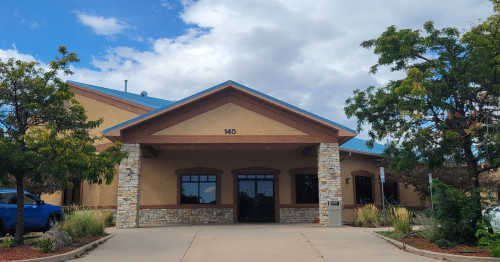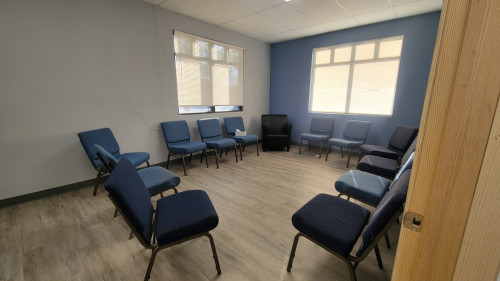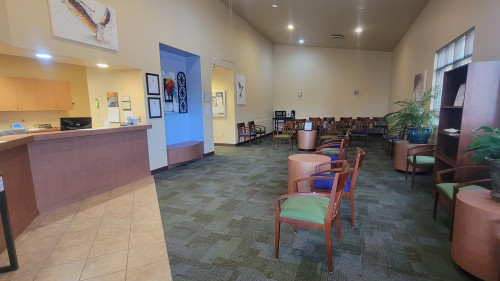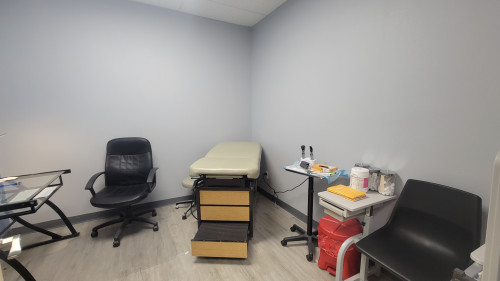






Recovery Unlimited
Treatment Focus
This center treats substance use disorders and co-occurring mental health conditions. Your treatment plan addresses each condition at once with personalized, compassionate care for comprehensive healing.
Primary Level of Care
Outpatient treatment offers flexible therapeutic and medical care without the need to stay overnight in a hospital or inpatient facility. Some centers offer intensive outpatient program (IOP), which falls between inpatient care and traditional outpatient service.
This provider hasn't verified their profile's information. Are you the owner of this center? Claim your listing to better manage your presence on Recovery.com.
Treatment Focus
This center treats substance use disorders and co-occurring mental health conditions. Your treatment plan addresses each condition at once with personalized, compassionate care for comprehensive healing.
Primary Level of Care
Outpatient treatment offers flexible therapeutic and medical care without the need to stay overnight in a hospital or inpatient facility. Some centers offer intensive outpatient program (IOP), which falls between inpatient care and traditional outpatient service.
Private Pay
You pay directly for treatment out of pocket. This approach can offer enhanced privacy and flexibility, without involving insurance. Exact costs vary based on program and length of stay. Contact the center for specific details.
Recovery Unlimited
Recovery Unlimited
About Recovery Unlimited
Nestled in the eastern Knob Hill neighborhood of Colorado Springs, Recovery Unlimited treats individuals and couples with substance use disorders, and they treat co-occurring mental health disorders and trauma in the process. Their program includes off-site detox and 12-week intensive outpatient (IOP) care.
Accessing Care
Recovery Unlimited's staff of 25 supports over 500 clients at a time.
Clients can do the detox at home or at the El Paso County Detoxification Center (also known as Sandstone Care Detox Center), which is 15 minutes north of Recovery Unlimited.
The IOP is open by appointment 7 days a week from 8 a.m. to 7 p.m. They also accept walk-in clients on weekdays.
Using Evidence-Based Methods
Clients receive 9 hours of group therapy and 1-on-1 time with a licensed counselor each week. The treatment therapies they receive are cognitive behavioral therapy (CBT) and eye-movement desensitization and reprocessing, proven methods that address co-occurring mental health concerns, trauma, and other underlying factors of addiction. Additionally, they help clients manage medications and administer Vivitrol and Suboxone to make it easier to stop using drugs. To monitor clients' recovery, Recovery Unlimited performs drug screenings.
To prevent further addictions, Recovery Unlimited doesn't prescribe these medications: Ambien, sedative hypnotics, opioids, benzodiazepines, or stimulants.
Their peer support program coaches clients with their long-term recovery.
Assisting Clients with Legal and Other Medical Needs
Recovery Unlimited's team provides level 4+ DUI services and parole support to help clients stay out of jail and in recovery.
They can connect clients with a primary care provider to address other routine and urgent medical needs.
Supporting the Family
Recovery Unlimited facilitates free 90-minute family support sessions each week so clients have a supportive environment for their long-term recovery.
Committing to High-Quality Care
Recovery Unlimited's vision is "a world free from chemical addiction," and their values are trust, compassion, accountability, and respect. The owner holds a Colorado Addiction Counselor III (CACIII) certification, and the leadership team includes licensed counselors and administrative staff.
Center Overview
Treatment Focus
This center treats substance use disorders and co-occurring mental health conditions. Your treatment plan addresses each condition at once with personalized, compassionate care for comprehensive healing.

Cash Pay Rates
Estimated Cash Pay Rate
Center pricing can vary based on program and length of stay. Contact the center for more information. Recovery.com strives for price transparency so you can make an informed decision.
Levels of Care






Your Care Options
Specializations
Family Involvement
Providers involve family in the treatment of their loved one through family therapy, visits, or both–because addiction is a family disease.
Who We Treat
Men and Women
Men and women attend treatment for addiction in a co-ed setting, going to therapy groups together to share experiences, struggles, and successes.
Approaches
Family Involvement
Providers involve family in the treatment of their loved one through family therapy, visits, or both–because addiction is a family disease.
Individual Treatment
Individual care meets the needs of each patient, using personalized treatment to provide them the most relevant care and greatest chance of success.
Therapies
1-on-1 Counseling
Patient and therapist meet 1-on-1 to work through difficult emotions and behavioral challenges in a personal, private setting.
Family Therapy
Family therapy addresses group dynamics within a family system, with a focus on improving communication and interrupting unhealthy relationship patterns.
Trauma-Specific Therapy
This form of talk therapy addresses any childhood trauma at the root of a patient's current diagnosis.
Eye Movement Therapy (EMDR)
Lateral, guided eye movements help reduce the emotional reactions of retelling and reprocessing trauma, allowing intense feelings to dissipate.
Medication-Assisted Treatment
Combined with behavioral therapy, prescribed medications can enhance treatment by relieving withdrawal symptoms and focus patients on their recovery.
Couples Counseling
Partners work to improve their communication patterns, using advice from their therapist to better their relationship and make healthy changes.
Conditions We Treat
Trauma
Some traumatic events are so disturbing that they cause long-term mental health problems. Those ongoing issues can also be referred to as "trauma."
Substances We Treat
Cocaine
Cocaine is a stimulant with euphoric effects. Agitation, muscle ticks, psychosis, and heart issues are common symptoms of cocaine abuse.
Prescription Drugs
It's possible to abuse any drug, even prescribed ones. If you crave a medication, or regularly take it more than directed, you may have an addiction.
Benzodiazepines
Benzodiazepines are prescribed to treat anxiety and sleep issues. They are highly habit forming, and their abuse can cause mood changes and poor judgement.
Ecstasy
Ecstasy is a stimulant that causes intense euphoria and heightened awareness. Abuse of this drug can trigger depression, insomnia, and memory problems.
Co-Occurring Disorders
A person with multiple mental health diagnoses, such as addiction and depression, has co-occurring disorders also called dual diagnosis.
Drug Addiction
Drug addiction is the excessive and repetitive use of substances, despite harmful consequences to a person's life, health, and relationships.
Heroin
Heroin is a highly addictive and illegal opioid. It can cause insomnia, collapsed veins, heart issues, and additional mental health issues.
Synthetic Drugs
Synthetic drugs are made in a lab, unlike plant-based drugs like mushrooms. Most synthetic drugs are either stimulants or synthetic cannabinoids.
Methamphetamine
Methamphetamine, or meth, increases energy, agitation, and paranoia. Long-term use can result in severe physical and mental health issues.
Languages
Aftercare
Care Designed for Your Needs
Special Considerations
Couples program
Using gentle clinical care, therapists guide patients and their partner through guided sessions to address issues and work towards lasting solutions.
Smoking and Vaping Policy






